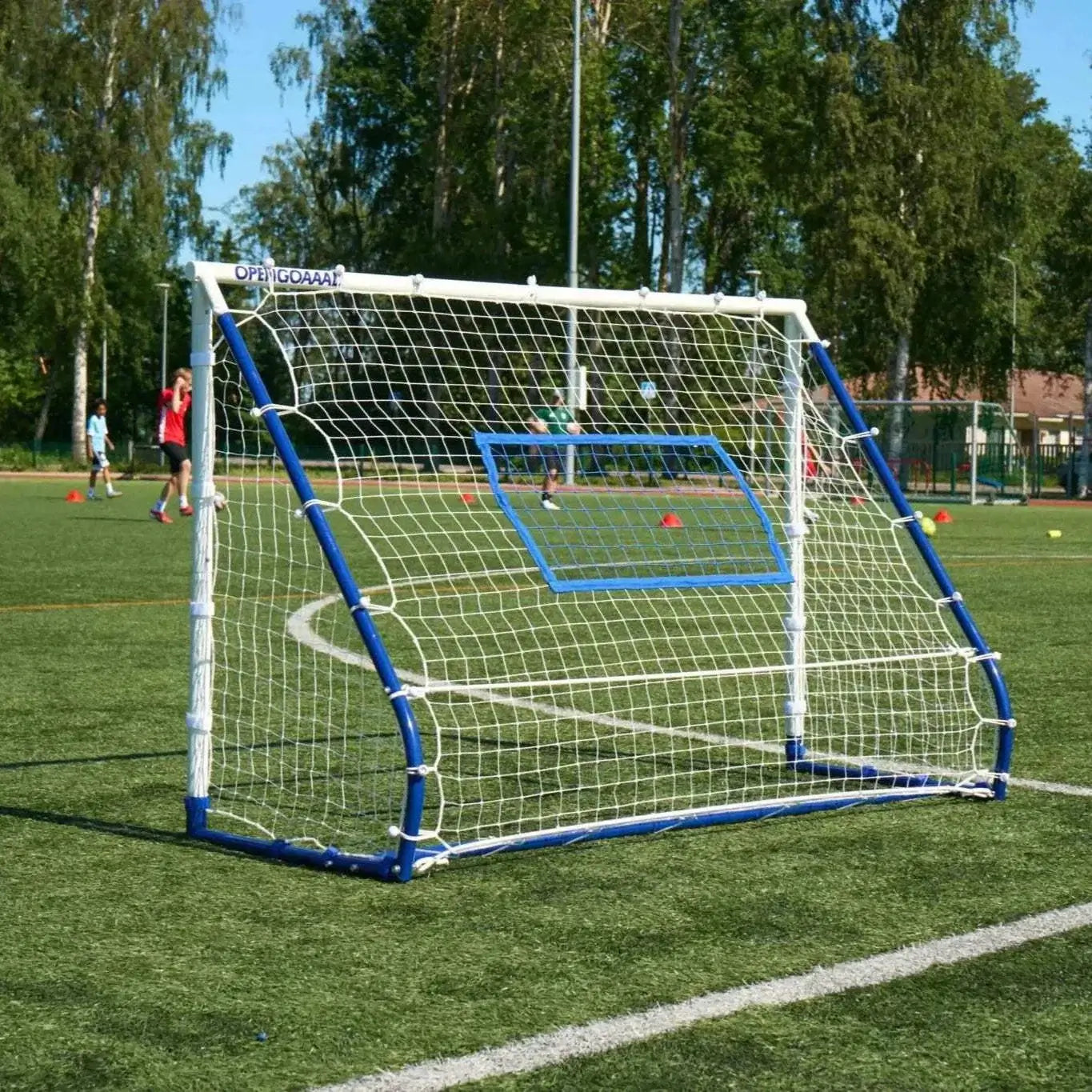The African Cup of Nations (AFCON) stands as a beacon of excellence in international soccer, particularly highlighting the rich tapestry of African talent. From its early days, the tournament has witnessed a meteoric rise in popularity. It's not just a sports event, it's a celebration of culture, unity, and the undying spirit of African soccer. Over the years, AFCON has become an eagerly awaited fixture in the global soccer calendar, bringing together nations in a vibrant display of skill, passion and competition.
Evolution of the Tournament
The journey of AFCON began in 1957, marking a significant chapter in African sports history. Initially featuring a modest lineup of teams, including Egypt, Sudan, and Ethiopia, the tournament has blossomed into a grand event that now accommodates 24 nations. This evolution reflects the growing talent pool and increasing competitiveness in African soccer. The expansion has not only brought more excitement and diversity to the tournament but also increased its global appeal, making it a pivotal platform for showcasing African soccer on the world stage.
Legendary Teams and Their Triumphs
Egypt: The Pharaohs' Reign
Egypt, affectionately dubbed the 'Pharaohs', has left its name in history as the most successful team in AFCON history. Their record of multiple titles is a testament to their enduring excellence and strategic mastery of the game. Egyptian soccer's golden era, marked by the emergence of iconic players like Mahmoud El Khatib and Mohamed Salah, has seen the Pharaohs dominate the continental scene. Egypt is the most successful country in the history of AFCON (as at 2023). They have won the tournament 7 times and are the only country having won it 3 times in a row (2006, 208, 2010). Their victories are not just a tally of titles, they symbolize the country's deep-rooted passion and investment in soccer.
Cameroon: The Indomitable Lions' Prowess
Cameroon's national team, the 'Indomitable Lions', stands as a symbol of resilience and strength in African soccer. Their journey in the African Cup of Nations is filled with tales of triumph and exceptional talent. Players like Samuel Eto'o and Roger Milla have become synonymous with Cameroon's soccer legacy, showcasing a blend of skill, determination, and flair. Cameroon’s most recent win of the tournament came in 2017 which marks their 5th win of AFCON. Their memorable victories have not only earned them accolades but have also inspired a generation of soccerers across the continent.
Nigeria: The Super Eagles' Ascent
The Nigerian national team, known as the 'Super Eagles', has consistently showcased its prowess in the African Cup of Nations. Their approach, combining tactical intelligence with raw talent, has brought them into the spotlight. The Super Eagles have been graced by soccer maestros like Jay-Jay Okocha and Nwankwo Kanu, whose skills have dazzled fans and opponents alike. Nigeria has won the AFCON 3 times with their latest victory after beating Burkina Faso in the 2013 final.
Ghana: The Black Stars' Legacy
Ghana's national team, the Black Stars, have been a powerhouse in the African Cup of Nations, known for their skillful gameplay and consistency. With a history rich in soccer excellence, Ghana has produced legends like Abedi Pele and Asamoah Gyan, who have their mark on the tournament. The Black Stars' have lifted the trophy 4 times (1963, 1965, 1978, 1982) and are definitely hungry to get their hands on the trophy again.
Ivory Coast: The Elephants' March to Glory
Ivory Coast, also known as The Elephants, has had a significant impact on the African Cup of Nations. Their journey is highlighted by a blend of physical prowess and technical skill, epitomized by players like Didier Drogba and Yaya Touré. The team's triumph in 2015 was a moment of jubilation and relief, marking the culmination of years of effort and dedication. Their previous (and 1st ever) win of the tournament came in 1992 after an epic penalty shootout against Ghana that Ivory Coast's won 11-10. Interestingly enough, the 2015 victory was agains Ghana as well after another epic penalty shootout which Ivory Coast won 9-8.
Algeria: The Desert Warriors' Rise
Algeria, often referred to as the Desert Warriors, has recently emerged as a dominant force in African soccer. Their triumph in the 2019 edition of AFCON was a testament to their tactical acumen and team cohesion. With stars like Riyad Mahrez leading the charge, Algeria has demonstrated a blend of tactical intelligence and technical finesse. Their recent success in the tournament has not only brought glory to the nation but has also inspired a new generation of soccerers in Algeria and across Africa. The 2019 trophy was their second time winning the tournament, the first win coming on home ground when they hosted the tournament in 1990.
Iconic Moments and Matches
The African Cup of Nations has delivered some of the most unforgettable moments in soccer history, marked by dramatic finals and groundbreaking matches. Iconic games have unfolded, featuring nail-biting finishes and historic upsets that have become an integral part of AFCON's lore. Among these, Zambia's emotional triumph in 2012 stands out as a victory that transcended sports, uniting a nation in a moment of poignant victory. Senegal's captivating journey to the finals is another highlight, illustrating the tournament's unpredictable and exhilarating nature.
Tournament Locations and Their Significance
The African Cup of Nations has traversed the continent, from Cairo's historical richness to Cape Town's scenic beauty, bringing a unique blend of soccer and culture to various African nations. Each host country adds its distinct flavor to the tournament, enriching the event with local customs, enthusiasm and spirit. The economic and cultural impacts of these tournaments on the host nations are profound, often serving as catalysts for national pride and unity.
Furthermore, the progression of soccer infrastructure in Africa is vividly reflected in the development of stadiums and sports facilities. From humble beginnings with basic playing fields, the tournament has witnessed the rise of modern, state-of-the-art stadiums. These architectural marvels are not just venues for sports but they symbolize the continent's dedication to improving its sporting infrastructure, showcasing Africa's ability to host events of international stature.
The Impact of AFCON on African Soccer
The African Cup of Nations has played a critical role in transforming the landscape of African soccer. Its influence extends beyond the international stage, deeply impacting the development of local leagues. The tournament has become a launchpad for emerging talents, providing a platform for young players to showcase their skills and attract global attention. Many African players have leveraged their AFCON performances as a springboard to join Europe's elite clubs, marking a significant step in their professional careers.
More than a sporting event, the African Cup of Nations has been instrumental in fostering unity, pride, and a sense of identity among African nations. It stands as a cultural and sporting cornerstone, embodying the spirit and aspirations of the continent. Through its celebration of soccer, AFCON has become a symbol of collective achievement and a source of inspiration for millions across Africa.
African Cup Of Nations Winners List
|
Year |
Winner |
Runner-Up |
Score in the Final |
|
1957 |
Egypt |
Ethiopia |
4–0 |
|
1959 |
Egypt |
Sudan |
2–1 |
|
1962 |
Ethiopia |
United Arab Republic |
4–2 |
|
1963 |
Ghana |
Sudan |
3–0 |
|
1965 |
Ghana |
Tunisia |
3–2 (a.e.t.) |
|
1968 |
DR Congo |
Ghana |
1–0 |
|
1970 |
Sudan |
Ghana |
1–0 |
|
1972 |
PR Congo |
Mali |
3–2 |
|
1974 |
Zaire |
Zambia |
2–2 (replay 2–0) |
|
1976 |
Morocco |
Guinea |
Round-robin tournament |
|
1978 |
Ghana |
Uganda |
2–0 |
|
1980 |
Nigeria |
Algeria |
3–0 |
|
1982 |
Ghana |
Libya |
1–1 (7–6 pen.) |
|
1984 |
Cameroon |
Nigeria |
3–1 |
|
1986 |
Egypt |
Cameroon |
0–0 (5–4 pen.) |
|
1988 |
Cameroon |
Nigeria |
1–0 |
|
1990 |
Algeria |
Nigeria |
1–0 |
|
1992 |
Ivory Coast |
Ghana |
0–0 (11–10 pen.) |
|
1994 |
Nigeria |
Zambia |
2–1 |
|
1996 |
South Africa |
Tunisia |
2–0 |
|
1998 |
Egypt |
South Africa |
2–0 |
|
2000 |
Cameroon |
Nigeria |
2–2 (4–3 pen.) |
|
2002 |
Cameroon |
Senegal |
0–0 (3–2 pen.) |
|
2004 |
Tunisia |
Morocco |
2–1 |
|
2006 |
Egypt |
Ivory Coast |
0–0 (4–2 pen.) |
|
2008 |
Egypt |
Cameroon |
1–0 |
|
2010 |
Egypt |
Ghana |
1–0 |
|
2012 |
Zambia |
Ivory Coast |
0–0 (8–7 pen.) |
|
2013 |
Nigeria |
Burkina Faso |
1–0 |
|
2015 |
Ivory Coast |
Ghana |
0–0 (9–8 pen.) |
|
2017 |
Cameroon |
Egypt |
2–1 |
|
2019 |
Algeria |
Senegal |
1–0 |
|
2021 |
Senegal |
Egypt |
0–0 (4–2 pen.) |
List of AFCON Winners
The Future of AFCON
The future of the African Cup of Nations is poised at an interesting juncture, marked by both challenges and opportunities. As the tournament expands, it grapples with potential scheduling conflicts with major European leagues and the growing need for advanced technology and infrastructure. These developments are crucial in shaping AFCON's future trajectory.
Central to the discussion is the debate around player welfare and the quality of officiating. The need for improved facilities is also paramount, not only for the tournament's growth but also for its sustainability. Additionally, the potential for further global recognition presents an opportunity for the African Cup of Nations to further establish itself as a major event in the world soccer calendar. Simultaneously, the tournament continues to play a vital role in nurturing African soccer talent, offering a global stage for showcasing the rich soccer skills present across the continent.
Conclusion
The African Cup of Nations, with its rich history and vibrant present, continues to be a beacon of soccer excellence on the continent. It has not only showcased exceptional talent but has also united nations through the shared language of soccer. The tournament's evolution from a small regional event to a globally recognized spectacle is a testament to its enduring appeal and significance. As AFCON continues to grow and face new challenges, it remains a crucial part of the sporting and cultural fabric of Africa, and its legacy will undoubtedly continue to influence the world of soccer for years to come.
FAQs
Who has won the most African Cup of Nations titles?
Egypt is the most successful team in the history of the African Cup of Nations, having won the tournament 7 times. Their dominance is marked by exceptional performances over the years, making them a formidable force in African soccer.
What are some of the most memorable upsets in AFCON history?
Notable unexpected upsets in AFCON history include Zambia's victory in 2012 against Ivory Coast and Cameroon's triumph over Egypt in the 2017 final. These matches are remembered for their unpredictability and the sheer excitement they brought to fans, showcasing the competitive spirit of the tournament.
How has the AFCON tournament evolved over the years?
The AFCON tournament has evolved significantly, expanding from just three teams in its inaugural 1957 edition to 24 teams in recent tournaments. This expansion reflects the growing soccer talent across Africa and has led to changes in the tournament's format, such as the introduction of group stages and knockout rounds to accommodate more teams.
What impact has the African Cup of Nations had on the careers of African soccerers?
The African Cup of Nations has been a crucial platform for African soccerers, often serving as a springboard to international recognition and lucrative contracts with European clubs. Players like Samuel Eto'o, Didier Drogba, Sadio Mane and Mohamed Salah have used the tournament as a showcase for their talents supporting their successful careers at top-tier clubs.
How does the African Cup of Nations affect domestic soccer leagues in Africa?
The scheduling of the African Cup of Nations often affects domestic soccer leagues in Africa, as key players are called up for national duty. This can lead to interruptions and changes in league schedules. However, the tournament also boosts the popularity of soccer and can lead to investments in local soccer infrastructure.
What challenges does the African Cup of Nations face in the future?
Future challenges for the African Cup of Nations include balancing the tournament schedule with global soccer calendars, especially the European leagues where many African internationals play. Additionally, there are challenges related to improving infrastructure, ensuring player welfare, and adapting to technological advancements in soccer.






























